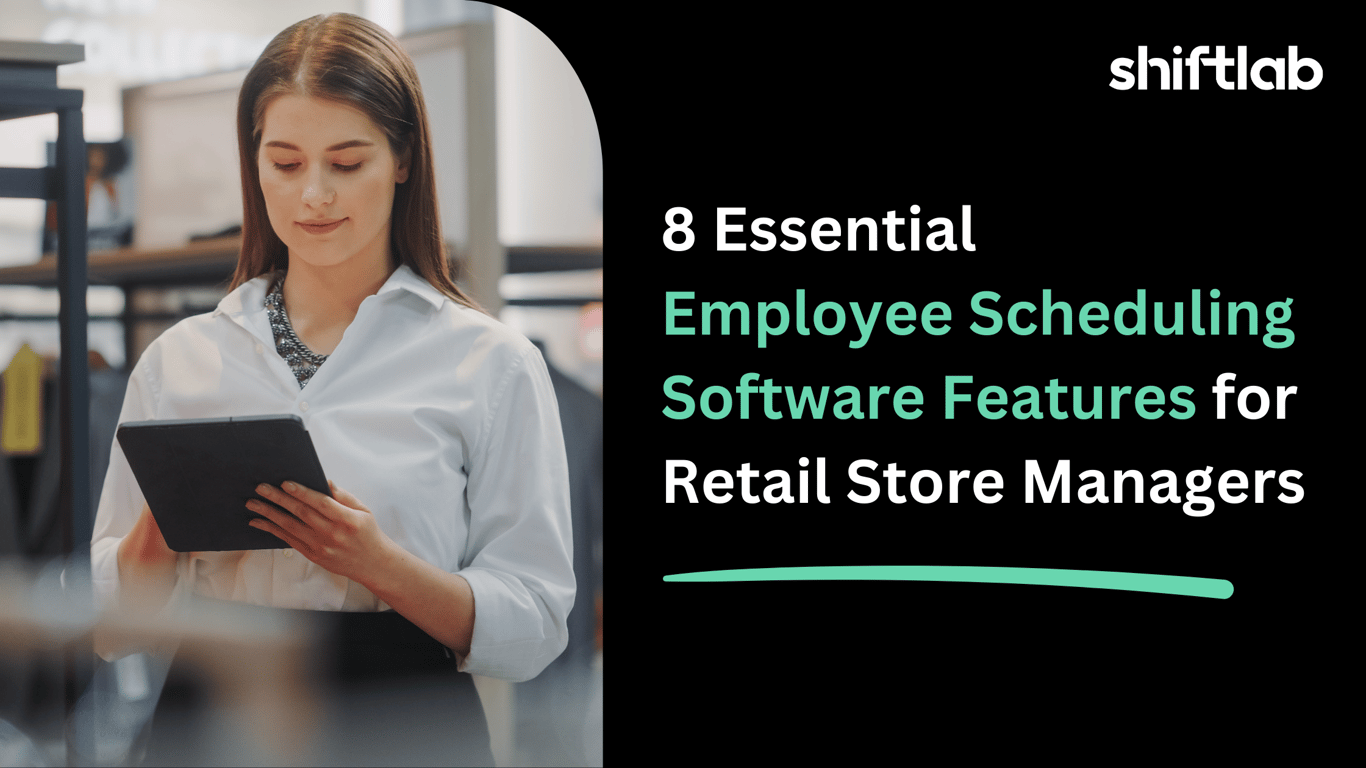
8 Essential Employee Scheduling Software Features for Retail Store Managers
Planning to upgrade your workforce management or employee scheduling tech stack? Whether you need add-ons to your existing platforms or you’re looking for a new scheduling solution entirely, you’ve come to the right place.
There are a lot of elements to consider when implementing a new employee scheduling solution — and ideally, you’ll choose one that is easy to set up and use, saves your team time, helps you automate manual or complex tasks, and even boosts your bottom line.
So where do you begin? Below, we’ll walk through eight scheduling software features we recommend looking for in an employee scheduling solution. They reflect recent updates in technology, trends in the industry that more retailers are moving to, and important features for streamlining your entire scheduling and workforce management process. Let’s dive in!
1. AI-driven scheduling
If there was one major trend across software and tech companies in the past few years, it was the addition of AI-driven features and tools — and AI (artificial intelligence) isn’t going away anytime soon.
Workforce management technology is no exception to the trend. AI can help retail teams automate the scheduling process, analyze store data, forecast for demand, and more. Basically, it can save your managers a lot of time on manual tasks and help them stay on track with budgets and labor demand by forecasting more accurately.
Just picture the forecasting and scheduling process without AI (or maybe you’re already doing this): managers would have to spend hours digging up and analyzing past data and trends, factoring in overall company goals, trying to predict future demand, and then creating the best schedule based on all of that.
That takes up a lot of valuable time that managers could better spend elsewhere (like coaching their staff) — especially since AI can generally do all these things better and faster than humans.
For example, Shiftlab’s AI-driven forecasting engine uses historical sales data, recent trends, and event effects to accurately predict the labor demand for each store location down to the hour. Our clients achieve a scheduling accuracy of 98% or more and increase their sales, profitability, and guest satisfaction scores.
In addition, our AI-powered auto-budgeting feature enables you to align and unify your sales forecasts, labor plans, and budgets. Use the budgeting tool to determine long-term staffing requirements to help with recruitment planning.
Different forms of AI have been embedded in software for a long time now (chatbots, predicting trends by analyzing historical data, etc.) so make sure your team isn’t missing out on the benefits of this technology by choosing a scheduling solution that includes AI-driven features. Learn more about how to harness AI for retail scheduling.
2. Performance-based scheduling
Performance-based scheduling is the process of creating an optimal schedule based on individual employee performance as well as location performance and business trends.
Basically, it helps you capitalize on the sales and operational strengths of your team by putting your top performers in the most strategic shifts. Performance-based scheduling helps ensure your employees are scheduled at the right place and right time to maximize performance.
A side benefit is that it also helps eliminate human bias and error in the scheduling process by taking a purely data-driven approach (after factoring in individual employee needs and store requirements).
Too often, scheduling is a mundane, check-the-box task that doesn’t factor in sales and performance insights. And that’s typically not the managers’ fault: managers usually create their store schedules in a silo, using sheets or outdated tools, and without any specific data driving scheduling decisions or changes. They often don’t even have access to the data that they need to inform their schedules, or it’s too difficult and time-consuming to gather and analyze.
In short, many traditional scheduling tools make it hard to gain clear visibility throughout your entire retail business — from the leaders at the top setting high-level KPIs and goals, to each location’s sales data and trends, to the individuals actually managing a team and creating the schedule each week.
That’s why it’s critical to look for an employee scheduling solution that prioritizes performance-based scheduling. Specifically, look for solutions that provide:
- Store-specific sales forecasting and trend data
- Individual employee sales data
- Store location data (employees, management)
- Real-time reporting at both store level and C-suite
- The right technology to enable all of this — either in one platform or with easy integrations, so that your team isn’t operating in siloed tools
Read our in-depth retail scheduling guide for more performance-based scheduling strategies and best practices.
3. Real-time actionability
Getting real-time data and notifications can make a huge difference to your team’s productivity and ability to solve problems throughout the day.
What if your district managers (DMs) got notified whenever a store was trending to open late? (This happens to roughly 10% of retail store locations daily, by the way!) Or if they could easily check in on an app to see who has taken their lunch break? Or at the end of the day, see whether any employees are trending toward overtime?
Finding a scheduling solution that includes real-time data and notifications empowers your managers to communicate more effectively and deal with operational issues faster.
But it’s essential that it’s easy to use so that your team will actually, you know, use it. And for most people, that means having the ability to use it on their phones. If your scheduling or workforce management solution includes a mobile app, that’s a huge bonus.
Guess what includes all these things? Shiftlab’s Store Pulse. 😉 Pulse is a real-time retail performance management dashboard (and mobile app) that empowers teams to be proactive on trends, problems, and business decisions.
Whatever solution you choose, real-time actionability is an important factor in helping your team stay aligned and on top of things throughout the day.
4. Automated scheduling compliance
Compliance probably isn’t your favorite thing to manage. All the federal, state, and local laws and regulations surrounding employment (paid and unpaid breaks, payroll, taxes, etc.) can be a headache to keep up with.
But it’s important to ensure your stores are staying up-to-date with these rules: it’s best for your team overall, not to mention the expensive fines for non-compliance.
Some scheduling solutions include built-in features for streamlining the compliance process. Things like overtime alerts, custom and mandatory break management, break attestation forms, simplified FSLA reporting, and more are helpful features to look for when evaluating platforms.
Anything that helps your team more easily track employee hours and payroll, ensure break and time off/holiday compliance, and notify about schedules faster will just make their lives easier (and help you avoid fines later).
5. Platform flexibility
A major headache (but critical piece) of shopping for a new workforce management solution is understanding whether it will work for your unique business structure, goals, and existing tech stack.
Large HRIS (human resources information system) cater to a wide variety of industries and can be restrictive when it comes to scheduling. Companies usually have to generalize their ‘secret sauce’ and find workarounds or change their current strategies and workflows to make the scheduling function work for their business.
Luckily, there are flexible scheduling platforms that can integrate with your HRIS to elevate your scheduling and time keeping. Shiftlab can deploy thousands of workforce strategies in a single upload — no need to shoehorn your strategies or workflows into our platform.
Shiftlab also eliminates the need for several different tools: it integrates scheduling, timekeeping, and time off management into a single solution.
Every business is unique, so make sure the scheduling software you’re evaluating will work for yours without requiring time-consuming changes or sacrificing our labor strategies.
6. Connectivity across the entire business
We mentioned earlier how visibility across the entire organization — from the C-suite down to individual front-line employees — is a major hurdle for creating optimal schedules.
Bringing all your information and data into one place (and providing easy access to anyone who needs to see it) helps break down those silos and keeps your team on the same page.
Shiftlab is connected to all of your core performance and cost platforms. Everything you need to maximize your job is centralized, and our integration flexibility and overlays bring everything together for your field team to manage and drive performance. (We support integrations with ADP, UKG, Paycor, Paylocity, and more).
In addition, our Leadership Dashboard shares critical labor data, key decision criteria, and performance indicators that allow leaders and managers to assess the effectiveness of scheduling decisions. Historical views track what worked and what didn’t, bringing transparency to labor strategies.
Successful retail businesses are aligned from the top down on their goals, trends, and challenges so that everyone is empowered to make data-driven decisions faster. The right workforce management and scheduling platform will help you increase visibility and connectivity throughout the entire business.
7. Innovation
In your search for a new employee scheduling solution, consider providers who are constantly innovating rather than staying stagnant.
A solution that considers client feedback, identifies industry trends, and stays on top of labor laws and updates will ultimately help you work smarter.
Additionally, look for a provider offering a partnership — not just a product — to go beyond implementation and walk alongside you as your needs and goals evolve. They should take the time to understand your unique business and help you make the most of your investment by advising and guiding you on much more than your daily to-do list.
Shiftlab delivers meaningful releases with new functionality every two weeks. We work closely with customers to understand their day-to-day challenges and quickly turn around solutions to help solve those challenges.
8. Fast time to value
Finally, the last thing to look for in your employee scheduling solution is how long it will take your team to implement and see value from it.
Enterprise platforms can take months to implement successfully. That’s valuable time and resources wasted on figuring out how to make the solution work for your business, training everyone on how to use it correctly (and making sure they actually adopt it), and meanwhile losing out on the value you could be seeing.
Shiftlab’s platform is launchable within weeks. During and after the launch process, you’ll have a dedicated Launch & Account Manager to tailor the platform to your goals, provide role-based training and communication, measure success, and ensure it’s a seamless user experience for everyone.
Our team understands retail — our co-founder and CEO spent nine years working in retail, from a sales associate to a VP of Sales Operations. He personally experienced the pain of scheduling, which was why he started Shiftlab.
And we still prioritize that firsthand experience: our entire team has an extensive background in retail and can empower you with the latest best practices proven to help other retailers grow.
On average, after implementing Shiftlab, our customers see:
- 10% Increase in profitability per employee
- 6% reduction in retail staff downtime
- 15% increase in guest experience scores
In short, Shiftlab was built for retail, and we’re dedicated to providing an industry-leading solution and making continuous improvements based on your feedback. We’d love to show you around the platform as you’re exploring a new employee scheduling solution – you can learn more and book a demo here.
%201.png?width=564&height=119&name=Shiftlab_Logo%20(Black)%201.png)



